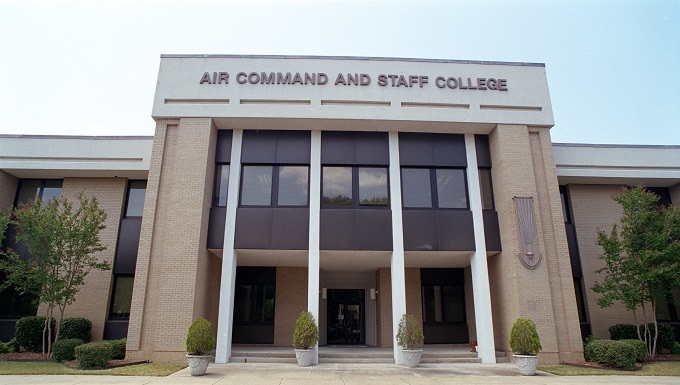
Air Command and Staff College has been working for two years to develop a plan to holistically incorporate space into its curriculum. A new program could be operational as early as academic year 2018. Air Force photo.
Air Command and Staff College (ACSC) is making plans to roll out a new advanced space studies program within the next year, John Terino, chairman of the department of airpower at ACSC, told Air Force Magazine. The program will be modeled on advanced studies programs, like the School for Advanced Nuclear Deterrence Studies at Kirtland AFB, N.M., and could be operational as early as the 2018 academic year, Terino said.
ACSC has taken heat recently from Rep. Mike Rogers (R-Ala.), who has said the school does not spend enough time—only two out of 40 hours—training officers to integrate space power into planning and operations. Now ACSC may bring in as many as four new “dedicated faculty with expertise from those types of programs in the space community.”
But a specialized course for space professionals is not the primary focus of ACSC’s efforts in space education, Terino said. The more important question is “whether the guys outside the space community know what’s going on” in space power. For this reason ACSC has spent the last two years working to integrate space “holistically” into airpower training.
“To teach air operations in a modern sense, you have to prep with space and cyber,” Terino said. You can’t spend “a day on space” and a “day on cyber.” So in addition to the new specialized course, the basic ACSC curriculum works to “integrate space with the rest of the community here” rather than have it “segmented off” on its own.
Because of that integration, Terino says it’s difficult to count up the number of curriculum hours ACSC students spend on space instruction. “It can’t be quantified,” Terino said, but without a doubt, “we’ve increased the amount” of space coverage over the last two years.
“A lot of this stuff we were thinking about and working on before Rep. Rogers” began his focus on space, Terino said. “We probably have the best space faculty of any institution, civilian or military, in the country.” That includes civilian PhDs who are teaching and publishing in their fields, but it also includes “patch-wearing” operators who have deep experience integrating space power into Air Force and joint operations.
So while changes have been made recently—and more are on the way—to improve the way space is taught at ACSC, Terino insists that “the space stuff has always been really, really important to us.”